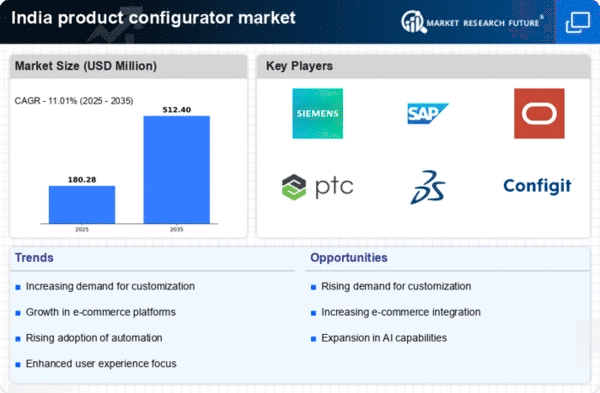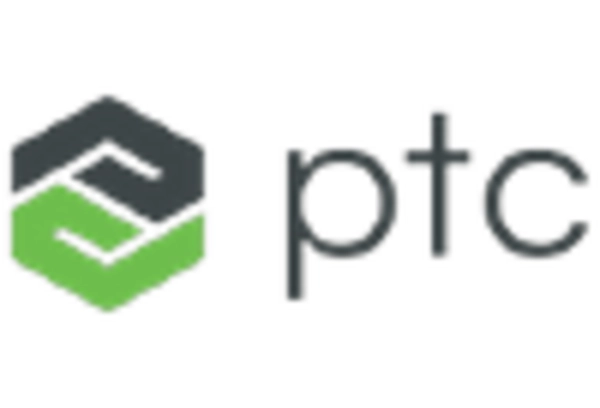Growth of E-commerce Platforms
The rapid expansion of e-commerce platforms in India is significantly influencing the product configurator market. As online shopping becomes increasingly prevalent, businesses are recognizing the necessity of offering configurators to enhance the online shopping experience. This shift is particularly relevant in sectors such as fashion and home decor, where consumers prefer to visualize and customize products before making a purchase. Data indicates that e-commerce sales in India are expected to reach $200 billion by 2026, creating a substantial opportunity for product configurators to thrive. By integrating configurators into their online platforms, companies can cater to the growing demand for personalized shopping experiences, thereby driving growth in the product configurator market.
Rising Demand for Custom Solutions
The product configurator market in India is seeing a notable surge in demand for customized solutions across various sectors. As consumers increasingly seek personalized products, businesses are compelled to adopt configurators that allow for tailored offerings. This trend is particularly evident in industries such as automotive and consumer electronics, where customization enhances customer satisfaction and loyalty. According to recent data, the market for customized products in India is projected to grow at a CAGR of 15% over the next five years. This growth is likely to drive investments in product configurator technologies, enabling companies to meet the evolving preferences of their clientele. Consequently, the product configurator market is positioned to expand significantly as businesses strive to provide unique and individualized experiences.
Increased Focus on Customer Engagement
In the competitive landscape of the product configurator market, companies are increasingly prioritizing customer engagement strategies. Engaging customers through interactive configurators not only enhances the purchasing experience but also fosters brand loyalty. Businesses are leveraging configurators to create immersive experiences that allow customers to visualize their choices in real-time. This approach is particularly effective in industries such as furniture and automotive, where customers benefit from seeing their customizations before finalizing a purchase. As customer engagement becomes a key differentiator, the product configurator market is likely to see a rise in adoption rates, with companies investing in advanced configurator solutions to enhance interaction and satisfaction.
Regulatory Support for Digital Transformation
The Indian government is actively promoting digital transformation across various sectors, which is positively impacting the product configurator market. Initiatives aimed at enhancing digital infrastructure and encouraging technology adoption are creating a conducive environment for businesses to implement configurator solutions. Regulatory support, such as tax incentives for technology investments, is further motivating companies to explore innovative configurator options. This supportive framework is expected to accelerate the growth of the product configurator market, as businesses seek to align with national digital goals. As a result, the market may experience a significant uptick in adoption rates, driven by favorable policies and a push towards modernization.
Technological Advancements in Software Solutions
Technological advancements are playing a pivotal role in shaping the product configurator market in India. The integration of artificial intelligence (AI) and machine learning (ML) into configurator software is enhancing the user experience by providing intelligent recommendations and real-time adjustments. These innovations allow businesses to streamline their operations and improve efficiency, ultimately leading to cost savings. Furthermore, the increasing adoption of cloud-based solutions is facilitating easier access to configurator tools, enabling companies of all sizes to leverage these technologies. As a result, the product configurator market is likely to witness a robust growth trajectory, with an estimated increase in market size by 20% over the next few years, driven by these technological enhancements.
















